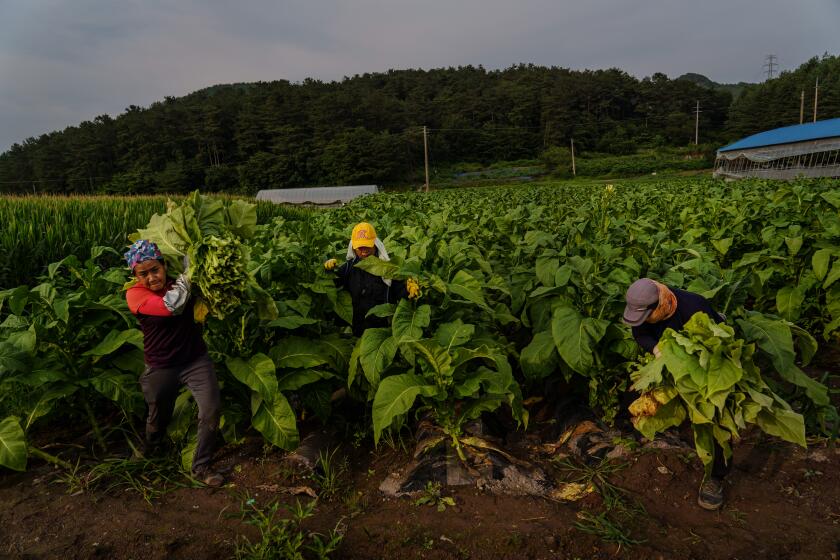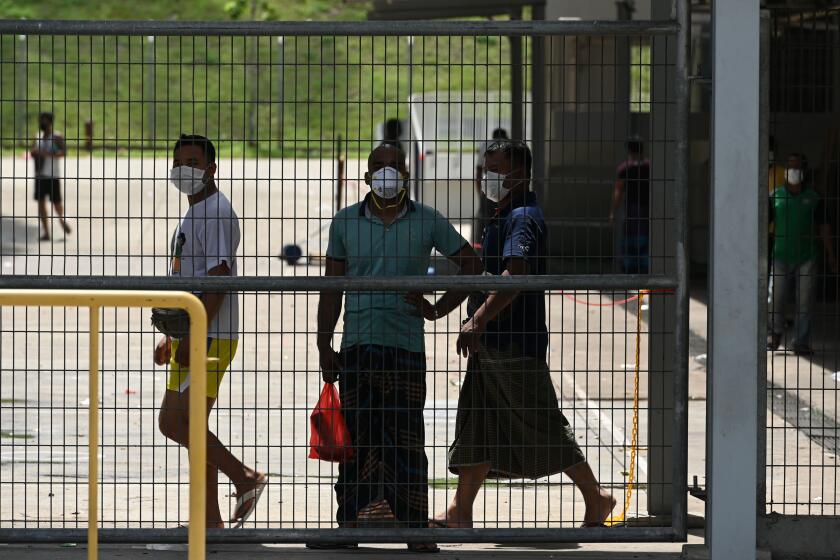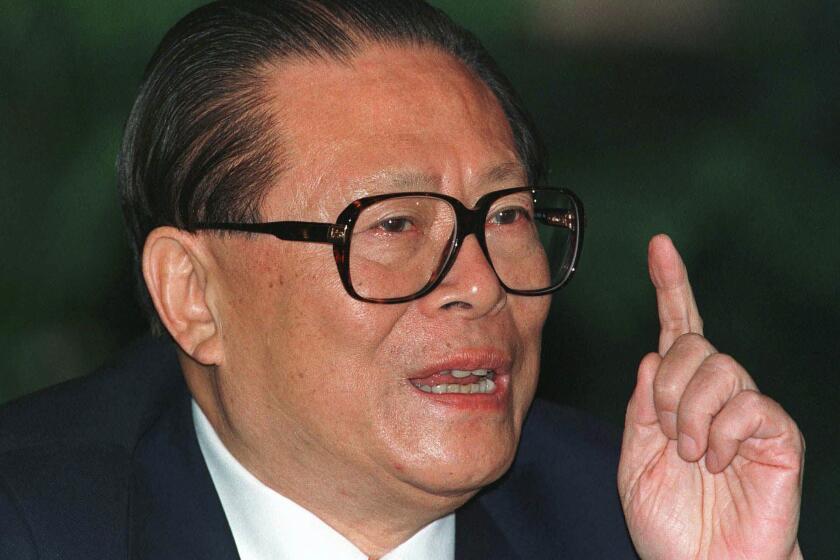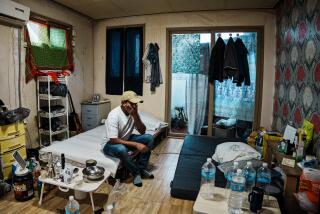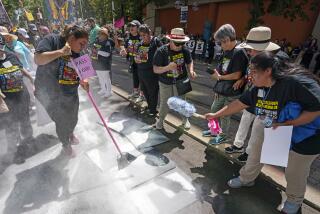These gloves help fight COVID-19. But they’re made in sweatshop conditions
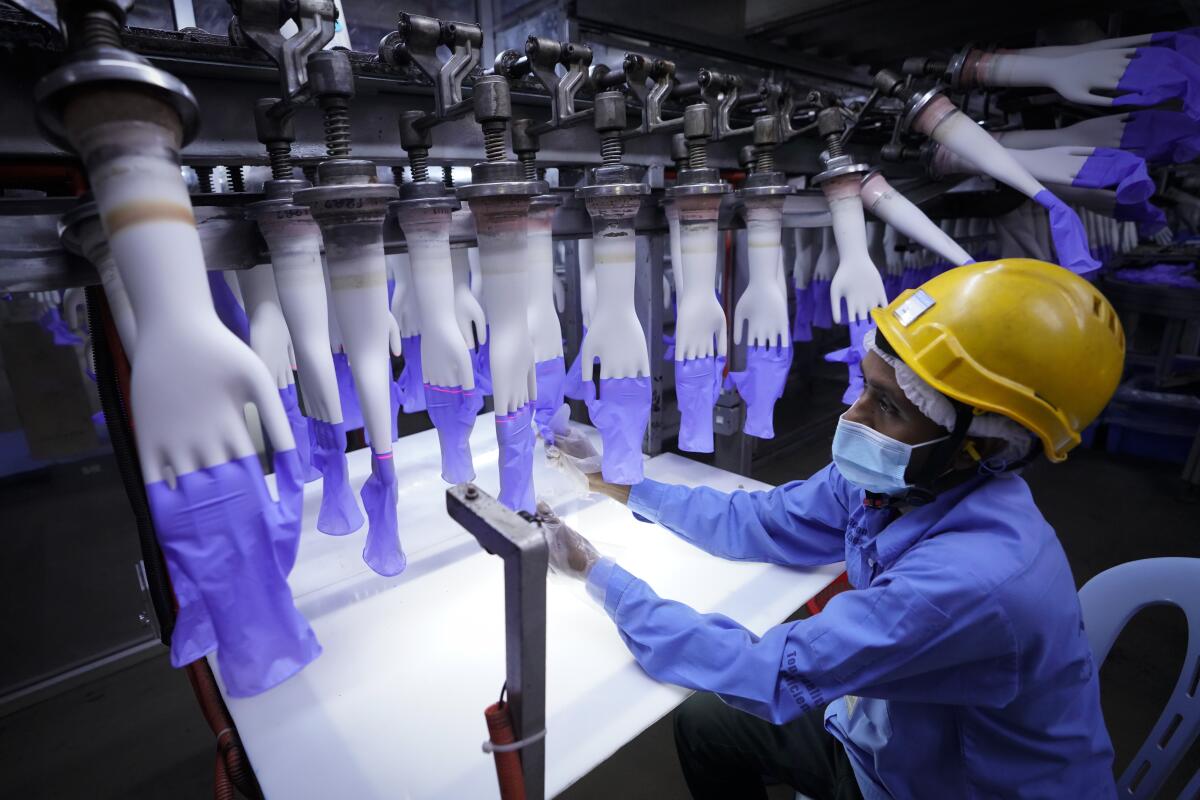
They work 12-hour shifts, six days a week, on factory floors where temperatures can surpass 100 degrees. Lunch breaks are brief, sick days highly discouraged. Take too long coming back from the bathroom and it’ll be docked from the next paycheck.
When the shift ends, they collapse onto bunk beds in crowded dormitories far from home, staring up at ceiling fans, knowing that the next day they’ll do it again — all for less than $1.50 an hour.
Such is life for tens of thousands of laborers from Nepal, Bangladesh and other countries toiling in Malaysia to produce one of the pandemic’s essential items: rubber gloves.
COVID-19 has created a windfall for the Malaysian companies that supply nearly two-thirds of the disposable latex and synthetic gloves used to fight contamination in hospitals, labs, pharmacies and kitchens worldwide. But record-breaking sales have been accompanied by fresh scrutiny over labor practices — especially treatment of the low-paid migrant workers who run the assembly lines.
The reckoning is fueled by an unlikely source: U.S. Customs and Border Protection, which has resurrected a century-old trade law to block imports from glove companies it suspects of using forced labor.
After years of complaints from labor rights groups, the agency in July banned products from Top Glove, maker of one-quarter of the world’s gloves, citing “reasonable evidence” that the company was subjecting workers to abusive living and working conditions, excessive overtime and what the International Labor Organization calls debt bondage.
The last allegation stems from the practice of charging recruitment fees — from several hundred dollars to nearly $5,000 —that often take months or years to work off, in effect trapping migrants in jobs until the debts are cleared.

An earlier ban against a smaller glove maker called WRP was lifted in March, just as COVID-19 began to race across the U.S. As part of the deal, WRP announced that it would repay up to $5 million in recruitment fees, ranging from $1,100 to $3,800 per worker, over the next 30 months.
The pressure has prompted at least four other companies, including Top Glove, to launch their own repayment plans and renew pledges to eliminate recruitment fees. Top Glove has also said it is upgrading workers’ housing in response to U.S. demands.
Activists regard the steps as important but insufficient against systemic violations. They argue that agents in the migrants’ home countries continue to charge fees and that the industry and its global customers have failed to take action against other abuses.
“These workers have been victims of forced labor for years and years,” said Andy Hall, a migrant-rights advocate based in Nepal. “It’s not enough to give them a small amount of money and think everything is going to be OK.”
The coronavirus crisis has frozen migrant labor, leaving farmers and workers desperate.
Top Glove’s promise to repay $12.8 million in recruitment fees to 10,000 foreign workers over the next year left many activists unimpressed — especially in light of the $321 million profit the company reported last quarter, its most lucrative ever.
Hall said that unless the company committed to a larger payout, it could face lawsuits from workers complaining they have been subjected to a form of modern slavery.
“A figure of closer to $50 million may be more accurate and appropriate,” Hall said.
The company also conducted an investigation into sexual abuse after Nepali workers accused a Malaysian supervisor of rape, employees said. According to an employee circular posted last week and seen by The Times, the company acknowledged sexual harassment at one of its factories and said it would establish hotlines and legal support for victims.
The notice did not indicate whether any employees had been disciplined.
Top Glove representatives declined to answer questions but said the company “remains wholly committed to worker welfare” and addressing U.S. concerns.
Despite the ban, Top Glove sits at the apex of a Malaysian industry that expects to sell 112 billion gloves worldwide this year, 48% more than in 2019. The company’s stock price has surged more than 400% since January, propelling founding chairman Lim Wee Chai into the ranks of Asia’s richest men.
Orders have doubled; the wait time for new shipments is a year or longer. The company is rapidly building new facilities to raise output to 100 billion gloves in 2021.
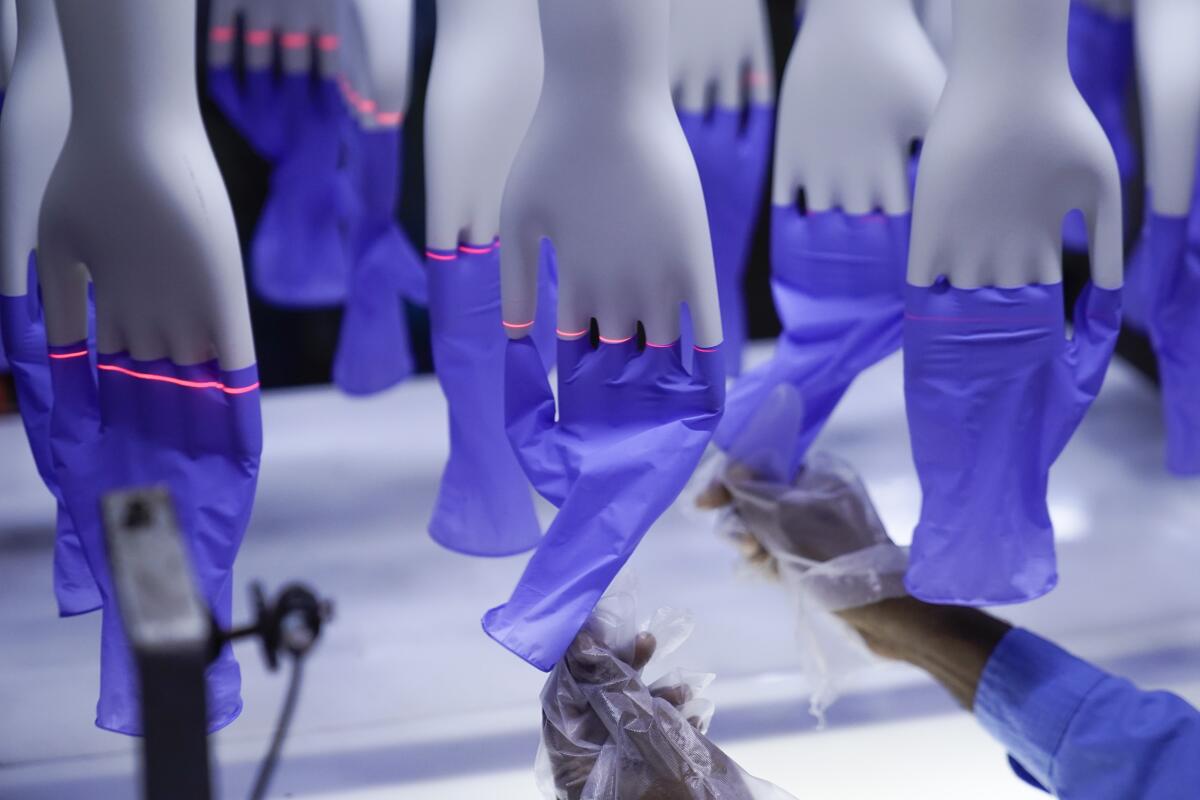
At a sprawling zone of factories outside the capital, Kuala Lumpur, production lines fitted with hand-shaped molds, latex-melting ovens and chemical baths churn around the clock. Workers say they have been under pressure to meet higher quotas with fewer staff, since hiring has slowed during the pandemic.
“The jobs are difficult. You have to meet targets, and you have to work continuously,” said Bahadur, a Nepali who has worked at Top Glove for six years. Like others interviewed for this article, he asked that his full name be withheld to protect his job.
Workers earn a minimum-wage salary of $290 per month that rises to more than $400 with incentives and overtime. All log close to the monthly legal limit of 104 overtime hours, but this year Top Glove asked them to work up to four more hours on their days off, for about $2 an hour.
The company dubbed the program “Heroes for COVID-19”; rights groups denounced it as illegal and unethical.
“Workers are getting one day of rest after six days, and they are exhausted,” Bahadur said. “The payment was not enough. So most of us refused.”
New infections among Singapore’s migrant workers offer a stark illustration of the risks to marginalized groups in densely inhabited parts of Asia.
An employee named Ashok said colleagues suffer from chest pains, allergies and itching they blame on factory chemicals and powder used to coat the gloves. He once fainted from the high temperatures, but said supervisors are generally unsympathetic.
“If I’m even a minute late to work, for any reason, the company deducts one hour from my salary,” he said. “When we’re sick, if we get a [doctor’s note] from an outside clinic the company doesn’t accept it, but if we go to one of the company’s clinics, it’s very difficult to get medical leave.”
More than 30,000 migrants — including from Myanmar, Indonesia and Vietnam — work in Malaysia’s glove industry, which sprung up in the 1980s to meet demand from the U.S. and Europe during the AIDS epidemic. Companies began manufacturing in latex, the product of rubber trees planted during British colonial times, but now work more often with synthetic materials.
The U.S. is the No. 1 customer, importing $1.6 billion worth of rubber gloves from Malaysia in 2019, according to federal data.
Customs and Border Protection said its action against two units of Top Glove signaled that “modern-day slavery will not be tolerated in U.S. supply chains.” The agency insisted it would not affect overall U.S. imports of the gloves. Other Top Glove subsidiaries, including factories in Thailand and China, remain eligible to sell to the U.S.
For an agency that stopped nearly 1 million people crossing into the U.S. from Mexico last year, its focus on the rights of migrants half a world away is relatively new.
A 1930 federal law prohibits imports of goods produced by forced or prison labor, but it wasn’t until a legislative change four years ago that the agency was free to target foreign companies. In the last 12 months the agency has issued 17 bans, known as Withhold Release Orders, against exporters of tobacco from Malawi, charcoal powder from Brazil and cotton from the Chinese province of Xinjiang, among other products.
“The law was created to protect U.S. industry from foreign competition, but we are now seeing it as a tool that can be leveraged for worker-focused human rights,” said Allie Brudney, a legal fellow at the Corporate Accountability Lab, a labor advocacy group. She added, however, that import bans are blunt instruments that in some cases could harm workers.
The U.S. action against WRP last September came months after Nepali and Bangladeshi workers went on strike over unpaid wages. The ban worsened the company’s already parlous financial state, freezing tens of millions of dollars in orders and threatening to put thousands out of work.
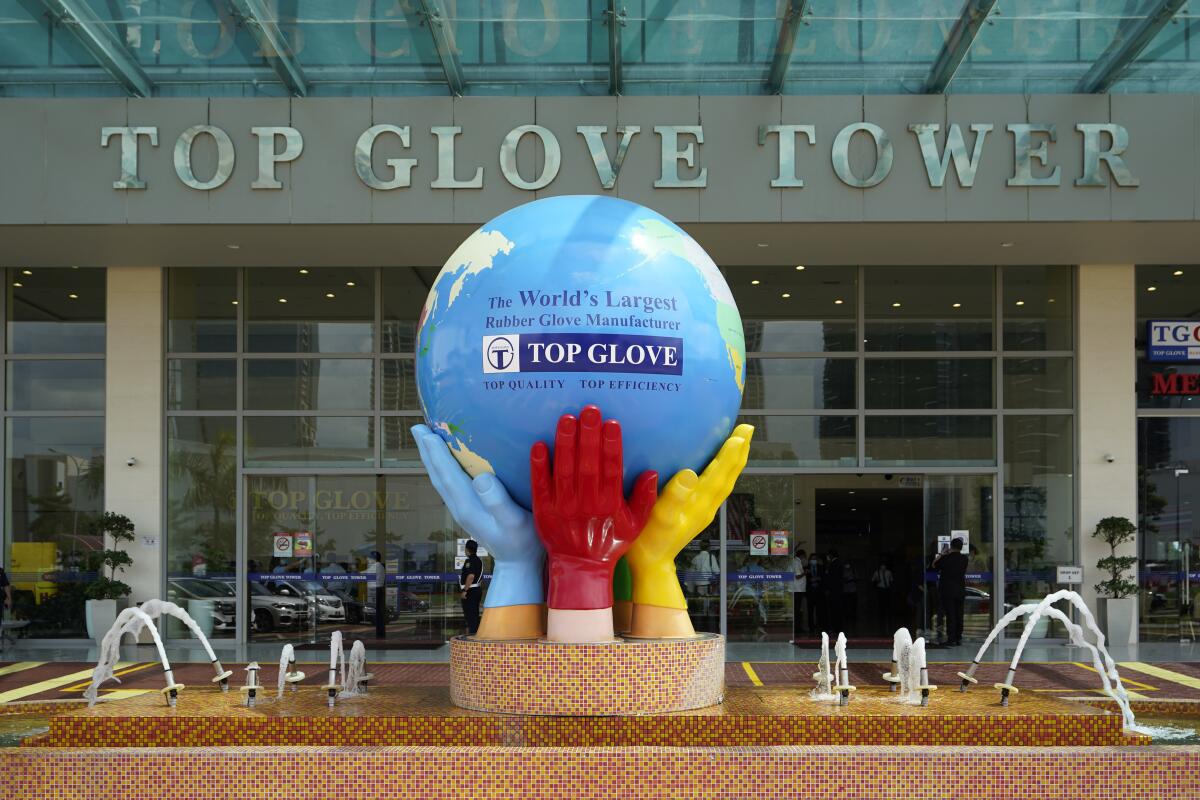
“By rights, every glove company in Malaysia should be on WRO right now,” said one industry executive who requested anonymity to discuss the U.S. policy. “But that of course would create a huge problem for the U.S. glove supply.”
At Malaysia’s second-biggest glove manufacturer, Hartalega, workers sleep 40 to a room in stifling dormitories, bunk beds placed just a few feet apart even during the pandemic. Last year the company said it would cover new employees’ recruitment fees, but workers say they continue to be charged.
Santosh, a Nepali hired earlier this year, said that when he visited a Hartalega recruitment agency in Katmandu, he was told that there were no positions available — only to find an agent waiting outside the office who said he could get him a job. Santosh ended up paying the agent about $420, borrowing money from relatives to cover the sum.
Under company policy, he is not eligible for a reimbursement.
More stories from Asia
Still, poverty and a lack of jobs at home continue to drive young migrants to Malaysia.
Ashok, the Top Glove worker, borrowed $2,400 to pay recruiters in Nepal and worked for more than a year to pay it off, including 36% interest. Each month he saves about $240 to send home, much of it going toward repaying an even bigger loan he took out to build a house for his wife, two children and parents.
So far, he said, the company has reimbursed him about $80 in recruitment fees. But he isn’t waiting for the full payout; once his home loan is paid off, he plans to return to Nepal.
“I went to Malaysia for a better future and had expectations that I could earn more,” he said. “Unfortunately, it is too difficult to stay here.”
More to Read
Sign up for Essential California
The most important California stories and recommendations in your inbox every morning.
You may occasionally receive promotional content from the Los Angeles Times.
